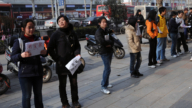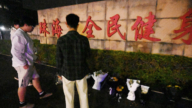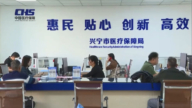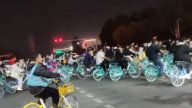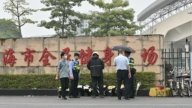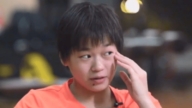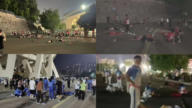【新唐人2012年12月01日訊】《紐約時報》最近有兩篇報導,是對於中國電影審查標準提出質疑。事實上,在中國電影界這已經是一個老問題了。尤其是在中共十八大召開期間,權力交接的時刻,敏感的電影更是有意的被擱置。報導還說,這種審查只是讓中國電影變得更平庸,無助於電影產業的發展。
原定於今年7月上映的電影《王的盛宴》,因為中共當局審查的關係,延遲到11月29號才開始公映。
《紐約時報》報導,這部電影被審查機構壓了將近五個月,審查機關似乎不希望中國觀眾在11月中旬國家領導人換屆之前,看到這部描寫推翻秦朝暴政建立漢朝的電影。
據了解,《王的盛宴》劇情是描述兩千年前的中國,秦王暴政,諸侯起義。當初在製片人和導演當中流傳一種說法,就是在十八大結束之前,這部電影是不可能上映的。
原《河北人民廣播電臺》編輯朱欣欣:「中共是草木皆兵,神經過敏,它怕老百姓任意的想像,項羽是古代的歷史故事我想它是不是聯想到霸王盛宴之後就是一個滅亡,所以一直把這電影壓到現在。其實正常上映大家不會如何如何,它一拖延反倒引起眾多的猜疑跟聯想。」
《紐約時報》報導還說,電影推遲上映反映了當今中國文化所面臨的一個核心窘境。當局想以管理經濟的方式來管理文化,持續干預使得文化陷入了極其尷尬的境地,審查讓中國電影變得平庸。
朱欣欣:「其實在中國,電影審查一直沒有一個專門像美國那樣很嚴的電影審查的法律,所以中共政治權利按自己現實的需要,可以隨意的任意的來對電影審查,所以導致中國無論電影還是其他方面,當然電影是最嚴格的,遭到一些審查,所以說中國沒有好的電影,整體文化水準上不去,跟文化專制有很大的關係。」
而另外一部電影《神探亨特張》,描寫北京警察追查詐騙犯的過程,順利的在7月20號準時上映。有媒體質疑,《神探亨特張》是一部以「類記錄片」的形式,實質是歌頌人民政府「英明偉大」的主旋律電影。
北京藝術家楊偉東:「我只是作為一個記錄片的導演,我的困惑是甚麼呢?我現在拍一部片子,拍了近5年了,拍的過程中,警察因為我拍這個片子搜查了我的家,抄走了我的電腦,多次約談我。2月份以後我的電話被斷過,我的網線被斷過,我們家門口出現過13個攝像頭。」
楊偉東表示,他在拍記錄片時受到來自公安的威脅。
北京藝術家楊偉東:「在今年4月18日限制我的離境,北京市通州市的警察的理由,就是因為我前期的採訪包括這次的,出去會殃及到國家的政治的穩定和安全,我是藝術家,我的工作就是從事藝術,我的創作的工作會殃及到國家的政治 穩定和安全,我不知道為甚麼。」
楊偉東認為,在中國,一個藝術家創作的作品,一旦進去公共領域,這件作品本身已經和藝術家沒有關係了,只能說創作條件是非常惡劣的。
採訪/陳漢 編輯/黃億美 後製/郭敬
New York Times: Censorship Causes the Chinese Movie
To Become Mediocre
“The New York Times” published two reports recently
which challenged the Chinese movie’s censoring standard.
In fact, it has hurt China’s film industry for a long time.
Especially during the Chinese Communist Party’s (CCP)
18th Congress, in which the CCP changed its leadership,
Films considered “sensitive“ have been shelved
at “sensitive“ times.
The reports also said that such censorship caused China’s
movie offering to be mediocre, and it will not help the industry’s growth.
A Chinese movie “The Last Supper" was originally
scheduled to be released in July this year,
but was postponed until November 29th,
after being censored by the CCP.
“The New York Times” reported that this film was blocked
by China’s censoring authority for almost 5 months.
The movie describes how the people overthrew the
tyranny of the Qin Dynasty and founded the Han Dynasty.
The censoring authority, it seems, didn’t want people
to see this film before the CCP leadership changeover in the middle of November.
The story of “The Last Supper” happened in China
2,000 years ago when the king of the Qin Dynasty was a tyrant, and the feudalists staged an uprising.
When the movie was undergoing production,
many producers and directors said that it couldn’t be released before the CCP 『s 18th Congress.
Zhu Xinxin, the former editor of “Hebei People’s Radio”:
“Everything is the enemy in the CCP’s eyes.
It’s too nervous, and afraid of the imagination of the Chinese
people Xiang Yu is an overlord figure in Chinese history.
I think CCP may be worried that in the film the
overlord died after the feast. So it has blocked the film until now.
In fact, if the movie could be released normally,
people would not think about other things.
but the postponement has attracted attention
and aroused suspicion.
“The New York Times” also reported that the
postponement of the movie reflects a core dilemma that today’s Chinese culture faces.
The authority wants to use the control mode
Used in the economy to control culture.
Sustained intervention has forced culture into
a very awkward situation.
The excess of censorship has caused the Chinese movie
to be seen as mediocre.
Zhu Xinxin: “In fact, China doesn’t have a dedicated strict
movie censoring law like the one in the U.S.
The CCP censors the movie by its political desire,
which has caused the current movie situation in China.
Of course, the censoring of movies is stricter than
in other countries. That’s the reason why there are no good movies in China.
The whole cultural level can’t be improved mostly
because of the dictatorship on the culture side.”
At the same time, another movie “Detective Hunter Zhang”
was released on July 20 smoothly,
this movie describes the process of Beijing police
investigating and tracking fraudsters.
Some media questioned that “Detective Hunter Zhang”
uses a similar documentary format to propagandize the CCP government as wise and great.
Yang Weidong, a Beijing artist:
“As a documentary director, what’s my confusion?
The documentary I’m making now was started
nearly five years ago.
During the shooting, the police searched my home,
took my computer away,
and interviewed me several times
because of the documentary.
In February of this year, the police cut off my phone,
stopped my internet connection,
and installed 13 surveillance
cameras in front of my home.”
Yang Weidong said he was threatened by police
when he was shooting the documentary.
Yang Weidong: “On April 18 this year,
the police didn’t allow me to leave China.
The police from Tongzhou Beijing said my interviews’
contents may risk the stability and security of the country.
I’m an artist. My job is doing arts.
I don’t know how my creative work can threaten
the stability and security of the country.”
Yang Weidong thought, once a work of art enters the public,
the art itself has no relationship with the creator any more.
The creative environment in China is very harsh.


